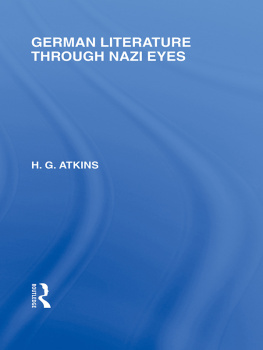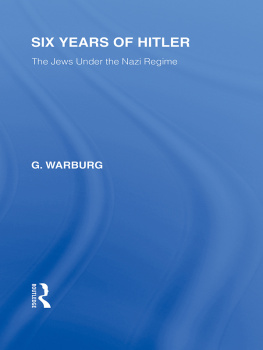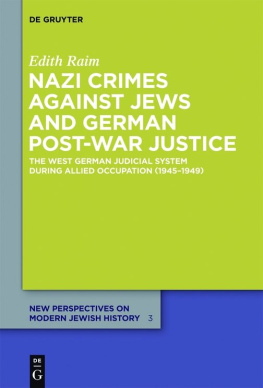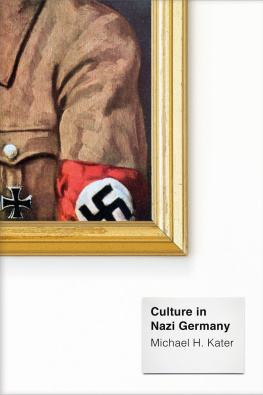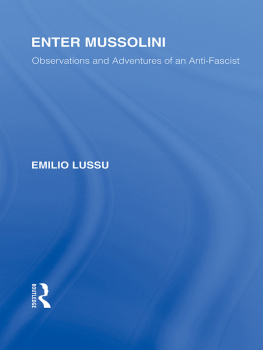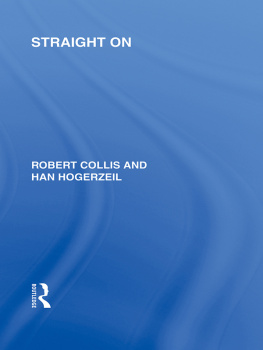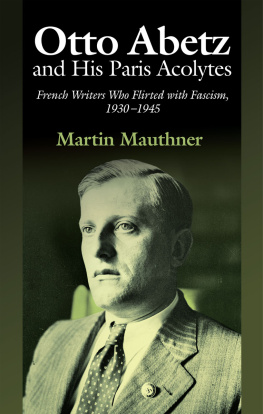ROUTLEDGE LIBRARY EDITIONS: RESPONDING TO FASCISM
GERMAN LITERATURE THROUGH NAZI EYES
GERMAN LITERATURE THROUGH NAZI EYES
H. G. ATKINS
Volume 10

LONDON AND NEW YORK
First published in 1941
This edition first published in 2010
by Routledge
2 Park Square, Milton Park, Abingdon, Oxon, OX14 4RN
Simultaneously published in the USA and Canada
by Routledge
270 Madison Avenue, New York, NY 10016
Routledge is an imprint of the Taylor & Francis Group, an informa business
This edition published in the Taylor & Francis e-Library, 2010.
To purchase your own copy of this or any of Taylor & Francis or Routledges collection of thousands of eBooks please go to www.eBookstore.tandf.co.uk.
1941 H. G. Atkins
All rights reserved. No part of this book may be reprinted or reproduced or utilised in any form or by any electronic, mechanical, or other means, now known or hereafter invented, including photocopying and recording, or in any information storage or retrieval system, without permission in writing from the publishers.
British Library Cataloguing in Publication Data
A catalogue record for this book is available from the British Library
ISBN 0-203-85015-7 Master e-book ISBN
ISBN 10: 0-415-57699-7 (Set)
eISBN 10: 0-203-85012-2 (Set)
ISBN 10: 0-415-57925-2 (Volume 10)
eISBN 10: 0-203-85015-7 (Volume 10)
ISBN 13: 978-0-415-57699-4 (Set)
eISBN 13: 978-0-203-85012-1 (Set)
ISBN 13: 978-0-415-57925-4 (Volume 10)
eISBN 13: 978-0-203-85015-2 (Volume 10)
Publishers Note
The publisher has gone to great lengths to ensure the quality of this reprint but points out that some imperfections in the original copies may be apparent.
Disclaimer
The publisher has made every effort to trace copyright holders and would welcome correspondence from those they have been unable to trace.
GERMAN LITERATURE THROUGH NAZI EYES
by
H. G. ATKINS
METHUEN & CO. LTD. LONDON
36 Essex Street, Strand, W.C.2
First published in 1941
Preface
MANY people are groping today for a key to the riddle of German mind and character. In war there is nothing more important than to understand the mentality of the enemy. A study of the light in which the Nazis present their own literature to the rising generation may help towards such an understanding.
The main theme of this book is not the elimination of Jewish influence. That is on the whole so complete as to require little comment. Some historians of literature simply ignore all Jewish writers, while others include them only to smite them hip and thigh. The only writers to be discussed at length, as notable examples of the treatment, are the Jew Heine and the half-Jew Heyse.
Nor is it to give an account of the Nazi elect, since there are plenty of books dealing with the approved volkhafte Dichter, and the most important of them will be found in the Bibliography.
The theme is rather the weighing in the Nazi scales of the leading German authors, the official revaluation of the national literature. No attempt will be made at an exhaustive treatment; the writers dealt with will be those, whether classical or modern, already enjoying an international reputation before 1933, who best illustrate the revaluation.
The case presented here is the Nazi case, the claim that all literature should be subordinated to the interests of the Nazi community. Nazi literary history is avowedly militant and propagandist. It is not claimed that the Nazi attitude to literature is the only one to be found in Germany today; there are still some who attempt, within the limits prescribed, to keep flying the flag of objective literary criticism. There are various literary trends in Germany, to say nothing of the emigrants. But one thing is quite plain. The Nazi version of German literature is the official version and it is supported by all the heavy artillery of the Nazi literary bureaucracy. It is the version drilled into the German youth as an expression of the ideals they should live by. And that is why it has to be taken seriously into account as an important aspect of Nazi ideology.
The repetition found in the various judgements on any given author shows the Gleichschaltung of Nazi criticism, while the creation of a stereotyped jargon is as pronounced in the literary sphere as elsewhere in the Nazi economy. Since it may be assumed that many people interested in the subject of this book can read German, the originals of the German passages quoted are given in an appendix. Too many generalities are written about things German; the aim here is above all to give documented evidenceto let the Nazis speak for themselves.
The section on Hauptmann has already appeared in The Nineteenth Century and After, and that on Thomas Mann in The Contemporary Review, and they are reprinted here by kind permission of the respective editors.
H. G. ATKINS
CATERHAM, December 1940
Contents
I
The Seizure of Power
WAS dem einen recht ist, ist dem andern billig is a fine old German saying. Its place has been taken in Nazi Germany today by a different slogan: Recht ist, was dem Volke ntzt, which being interpreted means, Whatever suits the Party is right. In literature, too, whatever suits the Party is right, and steps are taken to see that only such literature is now produced as fits in with the Nazi ideology, and that what is already written is presented in such a light as to bring out all favourable elements and to depreciate or ignore the rest
For literature, too, the Machtbernahme on 30 January 1933 was the beginning of a new era, a new dawn a Neubeginn der deutschen Kultur. Not only was new literature to be written, but a new history of literature, militant and propagandist Hitler in Mein Kampf tells us that propaganda is consistently one-sided statement, and since Hitler is quoted as an authority on literature in the more militant of the new histories, it is little wonder that that one-sidedness, which is one of the most marked of the Nazi characteristics, is evident here too. A melodramatic simplification is the keynote: literature is either Nazi white or anti-Nazi black.
Hitler was no sooner in power than things began to happen; writers had either to get on or get out, to toe the line or seek a healthier clime. Hitlerism is renowned for its myth-creating fertility, and here too a myth was sedulously cultivated. This was the myth of an intrinsically worthless literature foisted upon the unsuspecting German people by an unscrapulous Jewish-controlled press on the one hand, and on the other a rich literature of truly German character deliberately and maliciously suppressed by the machinations of the same internationally-minded clique.
The real Dichter, so the story runs, as opposed to the mere Literaten, had been zurckgedrngt and totgeschwiegen. The terms Dichter and Literaten will be discussed in detail later, but needless to say which the Nazi writers are, Then suddenly the day of liberation came, and das geistig irregefhrte Volk saw its error.

